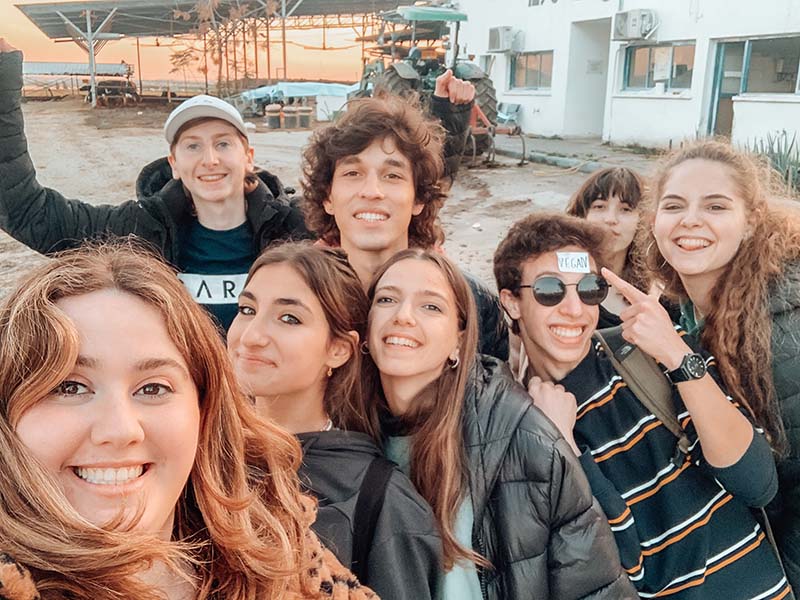When I got to Tel Aviv at the beginning of January, I knew it wasn’t going to be easy. Why would it be? Nothing worthwhile is ever easy, honestly. Especially when you’re going to another place that speaks one language (while also knowing English very well) and expecting them to understand, or at least, be able to function well.
In September, I, after a 10-day birthright trip where I found Hebrew would have been beneficial, hesitated but decided to download Pimsleur under the obligation of studying the lessons every day. In the Pimsleur method, there is no writing down. It is simply to listen, repeat, and retain. So, for around 15 days straight, I locked myself in my room for thirty minutes a day and grudgingly repeated every sentence back to my laptop. Newsflash: I soon gave up after this. Yet, it did help me learn how to say “I do not understand”. While this method didn’t work for me, it was probably the most realistic one I’ve tried.
Since I’ve arrived here, I’ve found immersing myself in the culture is the best way to learn. It does feel a little alienating to be sometimes the only one in the room not understanding, but I’ve now gotten used to it. If the only thing stopping you from coming to Israel is your fear of the language barrier, this post is for you. Hopefully, my five-step guide will serve you well.
1. Don’t be Afraid to not Know.
People in Israel seem to get a bad reputation in the states for not being friendly, yet, I’ve found they are just very direct. While at first, I was very nervous to go in somewhere and have them not understand, I’ve found that going into new places and broadening my horizons has only helped me. For example, on my third day here, I really wanted falafel. I found a store and walked in, but the man behind the counter didn’t know English. Instead of giving up, I walked onto the street and found a man who spoke English, and had him help me order. The man behind the counter showed me what everything was, and now whenever I see him on the street, I wave to him! It’s beautiful not to know something, and it’s great to be able to learn. The worst that happens is, if you enter a non-english speaking place, (which is so rare) Google Translate can be a good friend.
2. Memorization is Key
Sometimes repeating the same steps every day is a good way to learn. Even learn accidentally. I’ve now had to go to the pharmacy three times, and by now, I pressed enough buttons on the self-checkout to figure out which means “Yes, pay” and which means “not ready”. While this isn’t the best game to play, and could possibly lead to your card being charged twice, it’s still good to be able to memorize things, which can help you in the long run.
3. Netflix/Youtube are Friends
If you ask an Israeli how they learned English besides school, a lot of them will tell you it’s from American television. Once you get to Israel, try watching shows that are in Hebrew with English subtitles. It will help a ton, you’ll pick up on some words, and have fun while you’re doing it.
4. Learn the Basics
You don’t need to come to Israel knowing a lot. I have been here a month, and I still don’t know much at all. Yet, if you can learn the super basic phrases, such as, “Excuse me”, “Thank you”, “My name is”, “Where is the restroom”, things like this, it will help you in the long run.
5. Immerse Yourself and Soak it all in!
While it can be scary to meet new people, go new places, and live independently, I promise that the best way to learn is through immersion. When you go out and explore, you’ll hear all types of accents and see all new faces, new places, and experience things different from your home country. As cheesy as it is, a simple “Hi” can lead to an amazing conversation. I have found during my time in Israel, all I’ve wanted to do is learn and grow. So many places that I go, I love to introduce myself and talk about where I’m from, hear where they are from and have a nice conversation. Even in the shops, it’s nice to hear the stories of how they came to be. Learning how everything works can make it feel a little less scary.
It’s okay to be nervous to move to a new place for a multitude of reasons. In the big picture, we are all humans just trying to get by, and everyone has a story to tell, no matter where we are from. Whatever language you speak, this is a lesson that no barrier could ever come between.


















